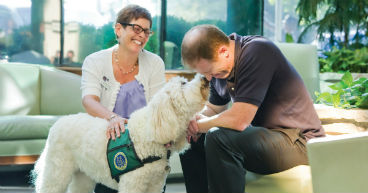
For animal lovers, the unconditional love and devotion of a beloved pet is among life’s most meaningful relationships. The deep bond forged with a furry family member makes us happier and healthier, according to the National Institutes of Health, which reports “interacting with animals has been shown to decrease levels of cortisol (a stress-related hormone) and lower blood pressure. Other studies have found that animals may reduce loneliness, increase feelings of social support, and boost mood.
For all those reasons and more, pets make popular Christmas gifts. But if you’re a cancer patient undergoing treatment, you may want to consult with their care team and consider the work and commitment required before welcoming a four-legged friend into the fold.
“The love and support of an animal is huge,” says Cynthia Ingram, BS, RN, HN-BC, COHN-S, Behavioral Health Provider at Cancer Treatment Centers of America® (CTCA), Chicago. Ingram led the Animal-Assisted Therapy program at CTCA® Chicago until recently when her dog Tori retired.
“Sometimes, it feels good to be able to take care of something else,” Ingram said. “A pet is a constant companion, someone to talk to, someone to hang out with. We know with animal-assisted therapy, people have less depression, it lowers blood pressure, and a pet provides a wonderful distraction.”
While there are many positives to pet ownership, when you have cancer, there are also some potential pitfalls to consider before making the commitment. Certain cancers, and cancer treatments—chemotherapy, stem cell and bone marrow transplants, for example—may weaken the immune system, putting the patient at increased risk for infection.
Zoonotic diseases (the scientific term for when animals transmit disease to humans) may be spread from animal bites, scratches, saliva and feces. The U.S. Centers for Disease Control and Prevention (CDC) characterizes zoonotic diseases as those that are “caused by harmful germs like viruses, bacterial, parasites, and fungi” that may cause “mild to serious illness and even death” in humans. “Animals can sometimes appear healthy even when they are carrying germs that can make people sick, depending on the zoonotic disease,” the CDC website says.
Because of this risk, Ingram strongly recommends that cancer patients speak with their oncologist and their veterinarian to discuss their unique situation. For those given the go-ahead, Ingram has put together a checklist of do’s and don’ts to mitigate risk.
First and foremost, she says, the patient needs to make sure he or she is physically able to be a pet owner. ”If you’re going through treatment and not feeling well, you need to have a consistent backup who’s able to feed, walk and help take care of the animal,” Ingram says. “The biggest thing is to always wash your hands before taking meds, prepping food, doing dishes-anything really.”
Tips for animal lovers
Ingram offers these recommendations and suggestions for cancer patients or caregivers who already own a pet or are considering getting one.
All animals
- Make sure vaccinations are current.
- Keep the animal’s nails trimmed to reduce the chances of getting scratched.
- Avoid handling feces or urine. If the pet has an accident, ask someone else to clean it with a disinfectant.
- If your pet is sick, have someone else take it to the vet, and avoid contact until you know what’s wrong.
- If you get scratched or bitten, wash your hands with soap and water and immediately report it to your doctor.
- Make sure you can afford the cost of having a pet. “Not only do you need to feed them well, there are vet bills, and if you have mounting medical costs for yourself, you need to make sure you’re financially able to also pay for a pet,” Ingram says. “A lot of people don’t think about that.”
- Consider getting pet insurance. It’s less expensive earlier in a pet’s life. If you wait until the animal is older, the premium will likely be higher and pre-existing conditions are typically excluded.
Dogs
- Consider getting a dog that’s already potty-trained. While puppies are adorable, they’re a lot of work.
- Avoid buying a dog from a pet store. They are more likely to have medical and emotional issues due to bad breeding practices in puppy mills.
- Avoid dog parks. You don’t know whether the other dogs have had their shots and/or if they have a disease.
- On walks, have someone else pick up the dog’s feces. If that’s not possible, wear gloves and wash your hands immediately afterward.
- Don’t sleep with your dog and try not to kiss or snuggle him/her too close. Doing so increase your chances of getting scratched or coming into contact with the animal’s saliva.
Cats
- Keep litter boxes far away from food-preparation areas.
- Keep cats off countertops. If that’s not possible, use a disinfectant to wipe countertops and anything else the cat may have touched.
- Have someone else change the litter while you’re undergoing cancer treatment. Bacteria in the litter may wreak havoc on a weakened immune system.
Exotic pets
- Avoid them, if possible. “Reptiles, chickens, rodents, ducks and pocket pets tend to have different types of bacteria that could be problematic for people who already have issues with their immune system,” Ingram says.
- If you already own an exotic pet, Ingram recommends regular vet visits to ensure the animal is in good health (ask someone else to take it since a vet’s office is no place for someone with a compromised immune system).
- Have someone else clean the litter, cage or whatever the animals uses.
The powerful bond between animals and humans is a gift to those who are fortunate enough to experience it. “Pets give so much love and joy, and at your lowest moments, they look in your eyes, and you feel better,” Ingram says. Discussing pet ownership with your medical provider will help determine when the time is right to embark on the journey.
If you’d like to learn more about the behavioral health services we offer cancer patients, or if you’d like to talk with someone about your cancer treatment options, call us or chat online with a member of our team.



